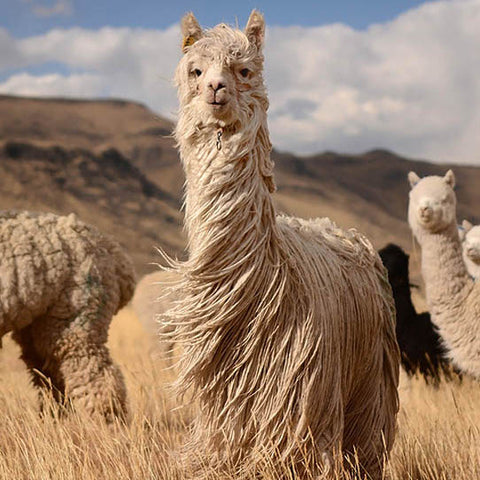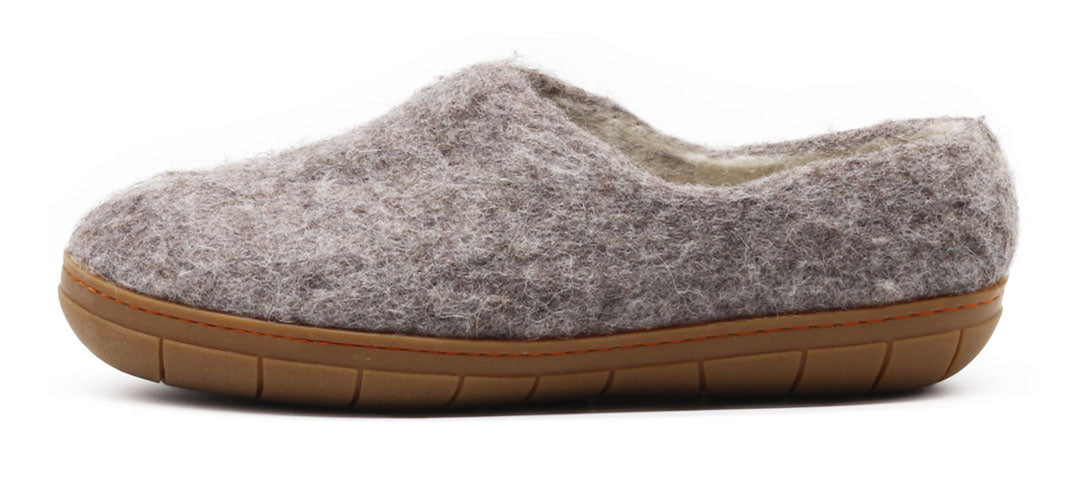Free shipping on orders over $150
Free shipping on orders over $150

11 Reasons Everyone Should Own a Pair of Alpaca Wool Socks
January 26, 2022 7 min read
Shop our Women's Nordic Knit Alpaca Wool Socks pictured above.
A warm, breathable pair of Alpaca socks should be in everyone's wardrobe and we're going to tell you why. Wearing alpaca socks on a daily basis will dramatically improve your foot comfort, both in and out of shoes. You're also no doubt familiar with the misery of having cold clammy feet jammed inside boots or shoes that don't breath well. Outdoor winter activities like cross country skiing, shoveling snow, snowshoeing, or just going for a walk in your snow boots all call for warm, wicking, breathable alpaca socks. Most other kinds of socks will cause to feet to sweat and then hold that sweat against your already chilly skin. Not fun!
But wait...alpaca wool socks aren't just for winter. Our alpaca socks are designed to wear with street shoes, dress shoes, snow boots and regular boots. They are thin enough to immediately integrate into your wardrobe and wear on a daily basis with any shoe. They are dense and tightly woven to give you all the benefits of premium alpaca wool without the shoe-tightening thickness of most wool socks. Wear these all year for temperature regulating, wicking comfort!
Nootkas women’s alpaca wool socks (in front of the cozy fire) are an example of well made alpaca wool socks that are a warm, comfortable, and the cashmere-soft addition to your perfect night-in or out. Alpaca socks are a sustainable and durable option that still leaves you stylish and warm. We came up with 11 reasons why you will want to own a pair of alpaca socks, and were sure there are probably a dozen more.
Why Buy Alpaca Socks?
1.) Temperature regulating
Alpaca wool is an excellent temperature regulator and thermal insulator. This means it stops heat from getting out and cold from getting in. This makes for warm and insulated feet, that most importantly, are not sweaty or clammy. It also means alpaca socks can be worn year-round because the thermal barrier will keep heat out as well and maintain a constant temperature within the socks.
2.) Hydrophobic
It sounds like the socks are scared of water, but it’s the other way around! Alpaca wool excels at wicking moisture and moving it out to evaporate. If it isn't able to immediately evaporate because your feet are in leather boots for example, it will still pull the moisture away from your feet leaving you feeling warmer and dryer than with most other socks. Meaning that all the sweat that comes out of your foot won’t get held against your feet like with cotton socks. Goodbye cold and clammy feet!
Keeping feet dry is our #1 piece of advice for foot warmth. Read about the other ways to stay toasty in our Tips & Tricks for Curing Cold Feet.
3.) Odor Reducing
Alpaca is great for socks because the same quality that’s so abhorrent to moisture means that the sweat and bacteria that cause bad smells are wicked away, alleviating some of the stink when our shoes come off. Wool is naturally anti-microbial so even if you wear your alpaca socks for weeks on end, they probably won't stink (much). Wool is not hospitable to odor causing bacteria and will help keep your feet, socks AND shoes from smelling like a gym bag.
Merino wool also does an excellent job of keeping foot odors at bay, which is why we use merino in our house slippers. It's a very high quality wool, but is more affordable than Alpaca for use in larger scale production like felted slippers. Our popular Astoria slippers are made of 100% merino wool.
4.) Hypoallergenic
Anyone with allergies of any kind knows and loves that word. Soft and breathable alpaca wool isn’t going to give you a rash because your body is reacting poorly to it. Alpacas do not product lanolin like sheep, so alpaca wool contains no lanolin, which some people are allergic to. This is great for those of us with sensitive skin who are always scared to try new fabrics - you don’t need to fear, alpaca is here!

5.) Oh so soft
With its low micron count, alpaca wool is a natural buttery soft fiber. It has often been compared to cashmere in its texture and feeling against the skin.
6.) Durable
Alpaca fibers are strong and elastic, meaning they won't lose shape quickly and will stand up to lots of wash and wear. Alpaca fibers are around three-and-a-half times stronger than human hair. When woven together and integrated with stretchy fibers like elastic, alpaca is made even more durable. It's likely you will get years and years of happy wearing out of your alpaca socks. If you are wondering why our alpaca socks are not 100% wool, it's because 100% wool socks would have no shape or stretch and would not be washable. Blending additional fibers into the alpaca wool does not reduce the benefits of the wool, but adds comfort and durability.
7.) Sustainable
Alpaca are sheared yearly when their fleece gets too long. This also helps the animal regulate its temperature and keeps it's skin healthy because hair mats do not stay on its body for very long. We work with farmers and suppliers in Peru who have been certified for treating their animals well and providing a high quality of wool.
Why Are Alpaca Socks Better than Alternatives?
8.) Cotton socks are very absorbent
Cotton socks are the go-to for most people because they’re cheap and can be found almost everywhere. The downsides lurking in cotton socks are dampness and friction.
Because cotton is absorbent, it’ll soak up all the moisture your feet put out, and keep it right there. Suctioned to your skin with the moisture your body just got rid of, cotton socks then rub. That friction can cause irritations and blisters, the misery of which most everyone has experienced at least once - before going on the hunt for better socks.
Also worth mentioning is that in colder climates, the last thing you want is a sponge full of frigid water wrapped around your foot while you’re outside. This can lead to catching a cold or worse, being extremely uncomfortable while you’re outside.
This advice also applies to slippers and any materials you have directly next to your feet. People buy cotton or synthetic slippers and then complain about their feet getting wet and cold and their slippers smelling bad. We did a deep dive into all the reasons wool is the best material for slippers and socks. Read about it here.
9.) Better socks promote better foot health
It's not very common, but there's a foot ailment called "trench foot" that can happen when your feet are damp for long periods of time. It's found more in the military and in people struggling with homelessness, but it's not unheard of in elderly people or folks in the hospital who do not change their socks often. It can be caused by both excessive sweating and prolonged exposure to damp conditions. Symptoms usually involved nerve pain or numbness, blisters and open sores, and infection.
This is also very very important for folks with diabetes, as they are more prone to having problems with their feet. Taking good care of your feet will go a long way to preventing diabetes related health problems. The bottom line is that keeping your feet warm and dry will keep skin healthy and improve circulation, all of which will help keep them healthier over the long run
Disadvantages of Alpaca Wool
We would be remiss if we didn’t touch on a few important things to know before buying alpaca wool socks. So here are things you should take on board before jumping on board with Alpaca Wool.
Higher Quality Means Higher Price
Because alpaca wool is not as common as other kinds of wool, and rare things are more expensive, alpaca is higher-end wool. 87% of all alpacas live in Peru, which affects availability and shipping.
Alpaca is also unlike other farm animals, with pregnancies of almost a year. This changes breeding needs and means there’s less availability, which means a higher price tag.
It’s not that much more expensive than other kinds of wool. The difference comes down to quality, shipping costs, and sustainability, but it’s often within a ten-to-twenty dollar range. This means it’s a question of whether having warm, dry, comfortable feet is worth a little bit of extra money.
Not Ethically Vegan
We’ll start with a disclaimer here - we’re not saying to eat the socks. When we talk about something being ethically vegan, we’re referring to the fact that alpaca wool is animal-derived.
So while the animals aren't harmed by the process of taking their wool to use for your new favorite socks, this means that it is not a good product for someone following the principles of ethical veganism.
10.) Why Alpaca is still the Answer
Alpaca wool is one of the highest quality materials you can choose for socks. Yes, you may spend a bit more on them, but it will be well worth it in the long run. By spending just $10-15 more on a pair of socks you are getting a vastly superior product than most any other sock on the market. The value of healthy, happy, comfortable feet is priceless.
11.) Last but not least, our responsible sourcing & quality commitment
Our alpaca wool is sourced from a Peruvian organization that is member of the IAA - International Alpaca Association and bears their mark of quality. For our customers, the IAA certification serves as a pledge that you are buying the highest quality alpaca wool and products. The organization seeks to promote the economic, social and environmental sustainability of the alpaca supply chain. They seek to ensure ethical and responsible practices on the part of the producers, industrial processors, garment makers, traders and craftspeople; and environmental awareness and respect for the Andean ecosystem and the Earth.
Conclusion
These cute and comfy alpaca wool socks are the perfect accessory for cozy nights in with your tea and blankets. Warm and soft, they’ll keep your feet toes-ty. (Please forgive the pun, it was just too good to pass up.)
These are a great option if you’re not looking for the traditional house slipper, but instead something warm that you can wear on those especially cold days that make your toes curl just to look at them.
Subscribe
Sign up to get the latest on sales, new releases and more …





